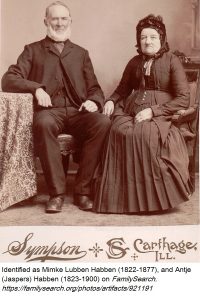 [note: this is reprinted from an earlier post on our old blog site from November of 2014]
[note: this is reprinted from an earlier post on our old blog site from November of 2014]
They say there is no such thing as a stupid question. That may be true, but one gets better answers if one asks better questions.
Genealogy message boards, Facebook pages, and other communication forums that genealogists use are inundated with questions and queries. Some of them get answers and some of them don’t. There are several reasons why questions go unanswered, but frequently writing a vague query is part of the problem.
Having administered several message boards, mailing lists, and Facebook pages, here are a few suggestions for creating a post that increases the chance someone who can help you actually does help you.
- Provide known information. Posts without dates or places are difficult to answer. Approximate dates or places can help–but clearly indicate they are approximate. While if “you knew all that information” you wouldn’t have a question, it is helpful to give readers an idea of the location and time period in which you are working.
- Organize your thoughts and information. No one wants to read through a circular discussion.
- Indicate what you’ve searched. It’s frustrating for a reader of your message to suggest sources or references which you have already used.
- Indicate what you want to know. What information are you trying to locate?
- Read your item before you actually post it. Catch mistakes, items you left out, etc.
- Surnames in upper case. This can be helpful when some last names are not known or when what looks like a last name is actually a middle name. It makes it easier for those interested in surnames to scan for those.
- Don’t abbreviate. Everyone may not know what your abbreviation stands for.
- Learn a little. Find out about local records in the area, when vital records start, who maintains probate records, etc.
- Use reasonable grammar. It is not necessary to write as if you were writing a formal composition. Failing to punctuate, using only one sentence for the entire post, using “he” and “she” so often it’s confusing, are ways that make it difficult for someone to understand what you are saying . (Note: I’m not suggesting being the grammar police, Grammar Nazi, etc. but it is important to write clearly so that others can understand. If nothing else, use sentences that are short and simple.)
- do not use “genealogy,” “help,” or anything equally vague in the subject line.
- Message boards that are county specific do not need the name of the county in the subject line (avoid “Hancock County Families” as a subject line for a message on the Hancock County message board).
- Message boards that are surname specific should not just contain the surname in the subject line (avoid “Jones Family” as the subject line for a message on a Jones family message board).
- how long you have been researching the person
- the fact that Grandma (or Aunt Myrtle, Uncle Bob) lied about the relative in question
- the fact that the person is your great-great-great-great-great-grandma

4 Responses
[…] a followup to “Before You Post that Genealogy Query,” I’ve posted some sample queries that may not be great are a good start to getting the […]
I see some of my mistakes I’ve been doing. Thank u for this information.
I would also suggest the query writer PLEASE capitalize all names of ancestors or relatives they seek. Some surnames are also common nouns; i.e., Street, Cotton, Brown, and that can be very confusing to the reader.
This response relates to queries received via Ancestry as a result of a hint someone found that pointed to one of my private trees.
I do find it helpful if I receive a query that states the inquirer’s relationship to the person for whom they seek information. Since I have multiple private trees for friends on Ancestry, I often do not recognize “grandpa’s” name in isolation, but I may recognize the surname of “grandpa’s” descendant and can figure out which tree I need to check. Better yet, it would be most helpful if they told me that tree name in addition to name/date/place particulars.